
New Caledonia is a sui generis collectivity of overseas France in the southwest Pacific Ocean, south of Vanuatu, about 1,210 km (750 mi) east of Australia, and 17,000 km (11,000 mi) from Metropolitan France. The archipelago, part of the Melanesia subregion, includes the main island of Grande Terre, the Loyalty Islands, the Chesterfield Islands, the Belep archipelago, the Isle of Pines, and a few remote islets. The Chesterfield Islands are in the Coral Sea. French people, especially locals, call Grande Terre le Caillou, a nickname also used more generally for the entire New Caledonia. Pro-independence Kanak parties use the name (la) Kanaky to refer to New Caledonia, a term coined in the 1980s from the ethnic name of the indigenous Melanesian Kanak people who make up 41% of New Caledonia's population. New Caledonia is one of the European Union's Overseas Countries and Territories (OCTs), but it is not part of the European Union.

New Caledonia is a French sui generis collectivity with a system of government based on parliamentarism and representative democracy. The President of the Government is the head of government, and there is a multi-party system, with Executive power being exercised by the government. Legislative power is vested in both the executive and the Congress of New Caledonia. The judiciary is independent of the executive and the legislature.
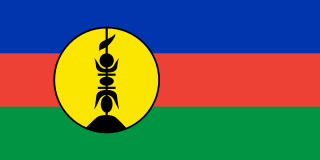
The Kanak and Socialist National Liberation Front is a pro-independence alliance of political parties in New Caledonia. It was founded in 1984 at a congress of various political parties. Its supporters are mostly from the Kanak indigenous population but also include supporters from other ethnic communities.
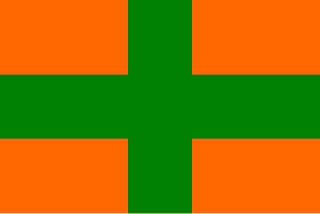
The Caledonian Union is a pro-independence and the oldest political party in New Caledonia. In the latest legislative elections of May 10, 2009, the party won around 11.65% of the popular vote, and 9 out of 54 seats in the Territorial Congress.
Jean-Marie Tjibaou was a French politician in New Caledonia and leader of the Kanak independence movement. The son of a tribal chief, Tjibaou was ordained a Catholic priest but abandoned his religious vocation for a life in political activism. He was killed in 1989 at aged 53.
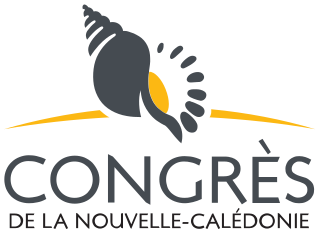
The Congress of New Caledonia, a "territorial congress", is the legislature of New Caledonia. The congress is headquartered at 1 Boulevard Vauban in downtown Noumea. Local media in New Caledonia refer to the congress as "boulevard Vauban" when referencing it.

The Labour Party is a New Caledonian political party established on 18 November 2007. It is radically pro-independence and backed by the trade union Union of Kanak and Exploited Workers (USTKE). It is considered close to the French alterglobalization movement led by José Bové.

The French Republic and the Republic of Vanuatu have long-standing bilateral relations which have varied over the years between tense and amicable. Vanuatu, then known as the New Hebrides, was a Franco-British condominium from 1906 to 1980, and maintained formal relations with both of its former colonial masters after gaining independence. Franco–Vanuatuan relations were rocked by a series of crises in the 1980s, and broke down completely on several occasions, with Vanuatu expelling the French ambassador in 1981, in 1984 and in 1987. Relations improved from the 1990s onwards and, today, France provides development aid to Vanuatu. The two countries also share amicable economic and cultural relations; both are members of the Organisation internationale de la Francophonie.
The Matignon Agreements were agreements signed in the Hôtel Matignon by Jean-Marie Tjibaou and Jacques Lafleur on 26 June 1988 between loyalists who wanted to keep New Caledonia as a part of the French Republic, and separatists, who did not. The agreements were arranged under the aegis of the Government of France as a result of discussions and compromises arranged by Christian Blanc, the negotiator for Michel Rocard's government.

The Kanaks are the indigenous Melanesian inhabitants of New Caledonia, an overseas collectivity of France in the southwest Pacific. Kanak peoples traditionally speak diverse Austronesian languages that belong to the New Caledonian branch of Oceanic. According to the 2019 census, the Kanaks make up 41.2% of New Caledonia's total population — corresponding to around 112,000 people. The other populations are the Caldoche, who are European born in New Caledonia; the Zoreille, who were born in metropolitan France and live in New Caledonia, in addition to about 10% that are non-Kanak Polynesians and 10% that are mixed race.

An independence referendum was held in New Caledonia on 4 November 2018. Voters were given the choice of remaining part of France or becoming an independent country.
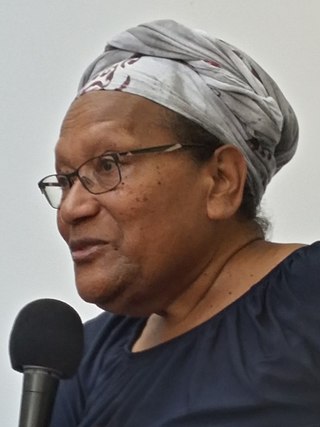
Déwé Gorodey was a New Caledonian teacher, writer, feminist and politician. She was active in agitating for independence from France in the 1970s. She published poetry, short stories and novels. From 1999, she was a member of the New Caledonian government, representing the pro-independence Kanak and Socialist National Liberation Front. From April 2001 to June 2009, she served almost continuously as Vice President of the Government of New Caledonia.

An independence referendum was held in New Caledonia on 4 October 2020. The poll was the second to be held under the terms of the Nouméa Accord, following a similar referendum in 2018.
Legislative elections were held in New Caledonia on 11 September 1977. Anti-autonomy parties won 19 of the 35 seats.
Legislative elections were held in New Caledonia on 18 November 1984. They had originally been planned for July, but were postponed due to threats by the Independence Front to boycott and disrupt the vote. Most members of the Front subsequently merged into the Kanak and Socialist National Liberation Front in September, and proceeded to boycott the elections. As a result, the Rally for Caledonia in the Republic won 34 of the 42 seats in a landslide victory. Following the elections, Dick Ukeiwé became President of the Government.
Early legislative elections were held in New Caledonia on 29 September 1985. They were called after the 1984 elections had been boycotted by the pro-independence Kanak and Socialist National Liberation Front (FLNKS) and were marred by violence that continued for several weeks after election day.
An independence referendum was held in New Caledonia, a French territory in the South Pacific, on 12 December 2021. The vote was the third and final one to be held under the terms of the Nouméa Accord, following votes in 2018 and 2020.
Marie-Claude Tjibaou is a former medal-winning athlete, Kanak activist and politician, and widow of the independence movement leader in New Caledonia, Jean-Marie Tjibaou.
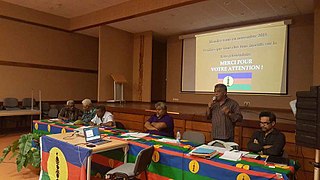
Louis Mapou is a Kanak politician who has served as the President of the Government of New Caledonia since 22 July 2021. Mapou is New Caledonia's first native Kanak president since the position was established in 1999.
Caroline Machoro-Reignier is a Kanak politician in New Caledonia. A member of the pro-independence Caledonian Union, she led the Kanak and Socialist National Liberation Front alliance in the Congress of New Caledonia from 2011 to 2014. In 1988, she was one of the signatories of the Matignon Agreements between New Caledonian loyalists and separatists.











